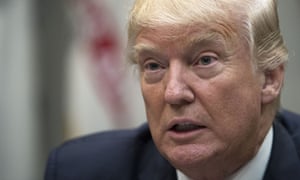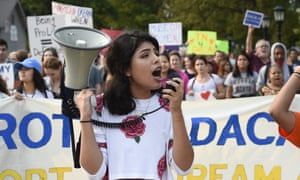
Donald Trump claimed on Tuesday afternoon that he has “a great heart” and “a great love” for the Dreamers. But hours earlier the US president had delivered what many saw as a kick in teeth and, like a school bully, he did so from a position of weakness rather than strength.
Trump’s decision to end Deferred Action for Childhood Arrivals (Daca) – the programme that protects young undocumented immigrants who were brought to the US as children or came with families who overstayed visas – marks another victory for his dwindling base, along with the exiled Steve Bannon, now back at Breitbart News.
But it triggered an avalanche of criticism from Barack Obama, Joe Biden and other Democrats, some Republicans and a legion of state governors, business leaders, activists and lawyers. Protesters gathered outside Trump Tower in New York, the White House in Washington and in other major cities. Along with the intense moral opprobrium at the sheer cruelty of the decision, there is a politically heavy price.
So why do it, and why now? The date of 5 September was set as an artificial deadline in an ultimatum by 10 state attorneys general, led by Texas, to put pressure on the administration to rescind Daca. Seemingly for the first time in his life, Trump ran away from a legal battle.
He also gave in to his hardline attorney general, Jeff Sessions, an anti-immigration zealot who contended that Daca could not withstand the legal challenge. Washing his hands of the matter, Trump allowed Sessions to coldly and clinically pronounce Daca’s fate.
This was despite the president not so long ago expressing disappointment in Sessions over his decision to recuse himself from the Russia investigation. It was thought he might fire the attorney general. But he could not bring himself to do it.
Even then, the most powerful man on the planet did not have the courage to make a clean break. He is delegating Daca to Congress to find an alternative in the next six months, clogging up an already overloaded timetable. Then on Tuesday night, he added more uncertainty with a tweet warning that if Congress did not act, then he would “revisit this issue”. It was not immediately clear what he meant.
Rick Tyler, a political analyst and co-founder of consulting firm Foundry Strategies, said: “By making a decision not to make a decision, they’re heading for a legislative collision course. They idea they would be able to fix Daca over the next six months is a bit of a fantasy.
“Politically, they wanted to make clear they rescinded Daca, when they didn’t. It’s like banning transgender people from the military, but not really. There seems to be a pattern.”
What is not certain is whether Trump’s agonising over Daca – the president was “at war with himself over Dreamers”, Politico reported last month – was out of concern for the nearly 800,000 people affected or for himself. Was he sincere in his statement that “I do not favour punishing children, most of whom are now adults, for the actions of their parents,” or a case of protesting too much?
Asked if Trump’s claims of compassion seem genuine, Tyler replied: “Baloney. I would think so, but I don’t think Trump is capable of empathy. He makes decisions based on how he believes he’s perceived. It’s unadulterated populism.”
Critics could point to similar examples: Trump told last year’s Republican national convention he would “do everything in my power to protect our LGBT citizens” but, once in power, scrapped protections for transgender students in public schools and banned transgender personnel from the military.
The best test will be his next rally and whether he boasts about the decision in the same breath as guaranteed crowd pleasers such as promising to build a wall and pardon sheriff Joe Arpaio. After all, Trump launched his election campaign describing Mexican immigrants as “killers” and “rapists”, criticised a judge of Mexican ancestry and quickly initiated a travel ban.
Lanhee Chen, a research fellow at the Hoover Institution thinktank in Stanford, California, said: “The immigration policy has been part of a piece. I expect him to say, ‘We finally have an administration getting tough on immigration laws and this helps that argument’.”


No comments:
Post a Comment